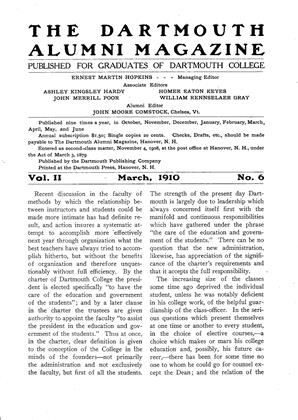The first chamber concert ever given at Dartmouth College by its own members, Monday evening, March 21, deserves a word of recognition and of commendation. The College is fortunate in having in the French department so experienced and gifted a violinist as Mr. Henry Wells, who turned aside from a promising professional career to take up the more congenial work of teaching. A pupil of Loeffler in Boston and Cesar Thomas in Brussels, with a love of teaching, enthusiasm, wide knowledge, pure taste, and splendid technique he brings to the training of his quartet just the qualities to draw out talent which he finds at hand. Through the efforts during a series of years of Professor Charles H. Morse, the musical director, a competent college orchestra has been developed whose rendering of the more popular music has given enjoyment. Professor Morse has also secured the services of outside artists for his annual Dartmouth concerts. That there is room for music of the more intricate, difficult, and classical character such as the smaller organization can give was shown by the hearty appreciation of the concert of Monday night. The beautiful lecture room of Dartmouth Hall was crowded to its full capacity of about five hundred, and the applause was instant, spontaneous and prolonged. Mr. Wells and his associates have every reason for congratulation on their first appearance; and for encouragement in their plan of perfecting and making permanent their organization and of giving a series of chamber concerts annually. The loss of the second violinist, Mr. Greenwood, who graduates this year from Tuck School, will be serious, and it will be difficult to replace the work of the Lewis brothers when their college course is completed. The quartet will suffer from the transitoriness which necessarily accompanies any college organization; but it will also make use of the succession of fresh talent which is constantly passing through the institution,and it will not fail to create and confirm a strong impression upon the music loving body of students. Even to those who had known Mr. Wells' gift of inspiring his pupils with his own love of the best in his art, the playing of the quartet was a delightful surprise. That in less than two months three men who had never done any ensemble playing, of this character, should attain such purity of tone, such precision of attack, such verve, such delicacy of shading, speaks wonders for their diligence as well as for their natural talent. The program follows. Ambitious and difficult as it was, the quartet had nothing to be ashamed of in its execution and everything to be proud of in the evident enjoyment which was given to the discriminating audience. In the Handel sonate for two violins and piano, the playing of Professor Ernest F. Langley was a delightful addition to the pleasure of the evening. In response to the insistent applause the lovely "Tristesse" of Goddard for the same three instruments was given. Also after the Dvorak terzetto the quartet played as an encore an andante from a Tschaitowsky trio.
ARTISTS
Henry Wells, first violin; Frederick Greenwood, second violin; Guy Lewis, viola; Roy Lewi's, violoncello; assisting artist, Prof. Ernest F. Langley.
PROGRAM
Mozart—Quartet in D minor Allegro moderato—Andante Menuetto (allegretto)—Allegretto, ma non troppo Handel—Sonate for 2 Violins and Piano Op. 2, No, 8 Andante—Allegro—Largo—Allegro Dvorak—Terzetto for 2 Violins and Viola Op. 74 Introduzione—Larghetto—Scherzo Schumann—Quartet in A minor. Op. 41, No. 1 Introduction—Allegro—Scherzo—Adagio - Presto
THE DARTMOUTH STRING QUARTET
 View Full Issue
View Full Issue
More From This Issue
-
 Article
ArticleTHE CRITICAL PERIOD FOR THE AMERICAN COLLEGE
March 1910 By Ernest M. Hopkins '01 -
 Article
ArticleRecent discussion in the faculty of methods
March 1910 -
 Class Notes
Class NotesLOCAL ASSOCIATIONS
March 1910 -
 Article
ArticleBASKETBALL
March 1910 -
 Class Notes
Class NotesCLASS OF 1899
March 1910 By Charles H. Donahue -
 Article
ArticleCOLLEGE NOTES
March 1910








